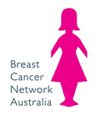
|
Actress Angelina Jolie's public comments about her decision to undergo a prophylactic (preventive) double mastectomy understandably raised concerns for many about their own health or potential cancer risk relating to family history.
This webinar, conducted in June 2013, sought to answer questions, discuss concerns, and provide guidance on the steps you can take to lower your cancer risk.
The following resources are mentioned in the webinar:
 Cut Your Cancer Risk brochure Cut Your Cancer Risk brochure
 Factsheet: Assessing a family history of breast and ovarian cancer Factsheet: Assessing a family history of breast and ovarian cancer
|
Supported by:

|
Contact the Cancer Council Helpline on 13 11 20 and speak with a cancer nurse if you have any further questions, concerns or would like support.
- You can Calculate your breast cancer risk on the Cancer Australia website, or see our breast awareness page to learn more about checking your breasts. ( Note: this is not an alternative to seeking medical advice.)
- The cheeky check up website has been designed specifically for younger women wanting to know about breast awareness and good breast health habits.
- See Breast Screen Victoria for more on screening.
- Your risk of cancer may change over time if a member of your family is diagnosed with breast or ovarian cancer, so you may need further clarification. For tips when visiting your doctor and collecting a family history see the Health Centre for Genetics Education in NSW.
- Whether cancer is in your family or not it's important to know where to get reliable information about breast cancer awareness, and minimise your cancer risk not only for breast cancer but for many cancers. We believe 30% of all cancers can be prevented! To learn more visit the Cut Your Cancer Risk site.